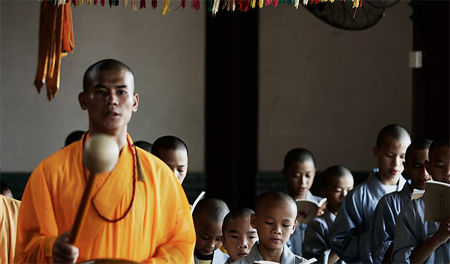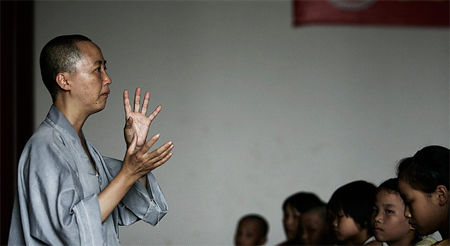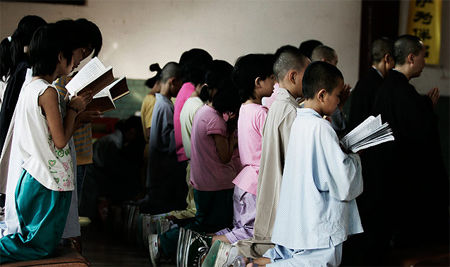In early August 38 children were sent to the Liuzu Temple in Zhaoqing City to start their lives as "monks" and "nuns". This activity, organized by the Xinfu Education Group, will be concluded on August 24. The children are not pressed to become Buddhists afterwards.
Wen Duo will be a junior middle school student again after a few more days. He was a mischievous child in school, but now he seems markedly polite and courteous, his teacher remarked.
His behavior changed with his hairstyle when the boy became a temporary "little monk". Together with 27 other children Wen entered the Liuzu Temple in Zhaoqing City on August 1. He reported that the temple had many rules and that the masters would give the children some slight punishment if they misbehaved.
On August 1, 28 boys entered Liuzu Temple to practice monkish lives. Seven days later ten girls also arrived. Xinfu Education Group organized the activity. Xin Lijiang, the president of the group, said that the children's experience would end on August 24. The kids are not going to become Buddhist disciples. "The temple simply provides free lodging with meals. It can be regarded as a very special summer camp, aimed at improving each child's personality. We are absolutely not advocating that they become Buddhist priests," Xin added.
Inside the temple each child received a Buddhist name on the first day. The monks tonsured the boys. Although the girls had no obligation to follow suite a few asked for the same haircuts as the boys.
A day in temple for these children
On the first day the children went to the temple, they were excited by the beautiful scenery around the temple. But their excitement was soon replaced by discomfort: vegetarian meals, getting up at four in the morning, memorizing difficult Buddhist classics and sitting still in meditation every day.
Zhen Yunsheng, Wen Duo's classmate, said that they gradually got used to the vegetarian meals but getting up so early remained difficult. Every day a monk teacher would lift them off the bed. The children would flop back on the bed like dolls.
Daily, they gathered at 5 o'clock in the Hall of Great Strength, the main hall of the temple, and started chanting and memorizing the Standards For Students, or Di Zi Gui, a Buddhist primer.
Breakfast is at six. Mrs. Yu, children's teacher, explained that although there's no meat, the meals are nutritious. The menu varies daily: fried noodles, fried rice noodles, vegetarian steamed dumplings, porridge and many kinds of pickles. After breakfast the children have free time. They may return to their rooms, but not to sleep -- the energetic kids review their lessons.
They go to class at nine. Masters of the temple check their ability in memorizing Standards For Students passages. The monks teach them the etiquette and rules of sitting, standing, walking, meeting people and kowtowing to Buddha. They are also taught how to show respect toward their teachers and parents, how to be polite, how to be modest and how to greet people.
Lunch is provided at eleven. The teacher explained that before these children entered the temple they couldn't imagine a meal without meat. When they had lunch at a regular school, if they didn't like the food, they ate a little and left the rest. But now at the temple the children finish their lunch down to the last grain of rice in their bowls. After lunch some children spontaneously clean desks and floors. With lunch over naptime arrives.
Afternoon classes begin at two o'clock with stories -- "Once upon a time, a teacher and his two students visited a family. The host showed them his most precious possession. But his treasure gets stolen one night. The host reported the theft to the officials. Obviously the thief was among the three guests. Finally, the teacher admitted he was the thief; he was punished by being tortured. As the teacher suffered agonies, he became seriously wounded and very close to death. At last one of his students, the real thief, couldn't bear to watch anymore. He admitted that he, himself, was the thief. Some people believe that this teacher was a fool. What do you think?" asked Master Jietan, a monk who conveys wisdom through Buddhist stories.
"No, he's not foolish!" children chorus together.
Then the master explains the principle of giving other people happiness through our own compassion and integrity. The students nod to show they understand.
Za-zen, or sitting cross-legged, is mandatory for every Buddhist. These children begin sitting at seven o'clock in the evening after supper. They must sit quietly for one or two hours. Mrs. Yu said that when they attended regular school, these naughty kids simply couldn't sit quietly and focus their attention at all. At the temple they also had problems at first, but now all the children can sit peacefully for one or two hours.
At 9:00 PM they go to bed.
Changed gradually
The children said that they were not unduly restrained in the temple. They could choose whether to dress in cassocks or ordinary clothes. Girls decided whether to cut or keep their hair. The temple masters did not force them to do anything; they simply taught the children to treat themselves and others nicely.
At first, the teachers weren't certain if these children would be able to adapt to temple life. But after a week no child wanted to leave. These children seem transformed into quieter and politer beings -- they ceased shouting and quarreling. Now they can focus their attention for a longer time. The children are quiet when they eat and when they meet their teachers they'll step aside politely.
Xin said that this kind of experience could be regarded as a short-term character cultivation camp. It gives children the unique opportunity to learn another aspect of life: the understanding and speculation of life itself. Besides, kids need to leave their parents for a while in order to learn how to take care of themselves.
"If this camp is deemed successful, we plan to send some teachers into the temple for the next step," Xin added.
(China.org.cn by Chen Lin, August 20, 2007)





